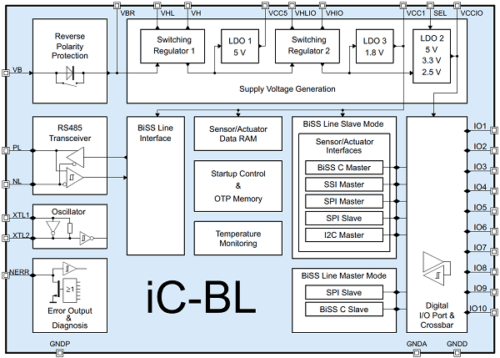iC-Haus has introduced the iC-BL bridge module that offers wide range of features to simplify BiSS Line Implementation on any platform.
Bidirectional Interface for Serial/Synchronous or as it is known as BiSS is a communication protocol used in industrial automation devices. BiSS Line is one-cable technology for BiSS interface and enables robust power and data transmission over just two or four wires. The presence of bidirectional sensor and actuator data transmission from BiSS Line master to BiSS Line Slave.

The iC-Haus’ new bridge module-iC-BL, offers a wide range of functions and a versatile I/O port. It simplifies the implementation of BiSS Line on any platform. As a BiSS C, SSI, SPI and I2C master as well as an SPI slave, iC-BL can be used as a BiSS Line slave to easily integrate a variety of technologies into BiSS Line on the sensor side. On the control side, BiSS Line communication with the BiSS Line master iC-BL is coordinated via the integrated BiSS C or SPI slave interface, so that safe transmission paths can be implemented in many applications.
The supply voltage range (5V, 7V…30V), an on-chip DC/DC converter for generating a stabilized sensor supply (2.5V, 3.3V or 5V at max. 200mA) and a non-volatile OTP memory for device configuration — all in a compact 5mm x 5mm QFN28 package enables huge flexibility for product application.
The versatile I/O port also enables parallel assignment of multiple interfaces (e.g. BiSS C and I2C/SPI). Additional sensor data, e.g. from an I2C temperature sensor or an SPI accelerometer for leading-edge Industry 4.0 applications such as condition monitoring and predictive maintenance, can thus be integrated very easily into the cyclic data transmission.
BiSS Line can also be implemented as a robust transmission channel between several microcontrollers. Even more complex bus systems with several BiSS Line slaves can be implemented in this way. The RS485 transceivers for differential communication are already included in iC-BL. Moreover, the integrated error correction makes the communication extremely robust even in harsh environments with electromagnetic interference fields (e.g. motor feedback applications, construction machinery) and allows corrections of up to 4 bytes.





